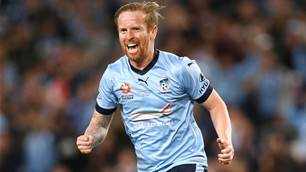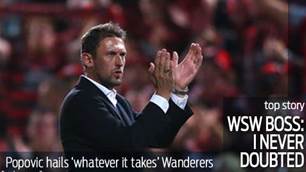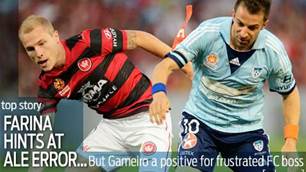Despite measuring just five feet five inches, Sydney FC’s new Brazilian Juninho is looking to make a big impact in the A-League.
Page 1 of 2 | Single page
Juninho doesn’t do mean. Posing for the front cover of FourFourTwo, our photographer is trying to coax the Brazilian World Cup winner to snarl into the lens. But he can’t do it.
“I can’t be mean,” says the amiable midfielder. “You have to play with joy in your heart. If you are angry then you don’t play well.”
If past form is anything to go by, then Juninho must be one of the happiest players in the world. A revelation when he joined Middlesbrough in 1995, he set the Premier League alight with his dazzling array of dribbling skills and killer passes. In 1997, he led the Teesiders to two cup finals as well as coming runner-up to Gianfranco Zola for the Football Writers’ Player of the Year Award.
However the season ended in tears – quite literally – as Boro were relegated on the last day of the season.
Spells at Atletico Madrid, Vasco da Gama, Palmeiras and Celtic are all proof of his pedigree, but for those who still doubt that the little man will bring an injection of class to the A-League need only look at his trophy cabinet. It’s there you’ll find a World Cup winners medal.
“It was a great moment in my career,” Juninho recalls. “The parties when we arrived back home in Brazil were amazing. It’s something you never forget.”
Now signed up as Sydney FC’s marquee player, Juninho is hoping not only the steer his side back to the top of the table but to raise the profile of the game in Australia to even higher levels.
“I have seen a lot of people playing football since I have arrived so I know it is popular but it’s a big challenge to make football the number one sport in Australia. I hope to make my contribution.”
We caught up with the diminutive midfielder at Star City Casino to find out what he has in store for the Sydney football faithful this season and what it feels like to be a World Cup winner.
How are you enjoying Sydney so far?
Very well thank you. I’ve had the opportunity to have a look around the city in my first few weeks here – I’ve been looking for a house so I’ve been able to see a lot of the city. It is important to get settled as soon as possible when you come to a new city. And it’s also important to get to know your team-mates too, training with them and playing in games so we know how we all play the game. When you get to know the players you can be more open when you talk to them about the game.
You’re no stranger to playing a long way from home, as you left Brazil
at just 22-years-old to play for Middlesbrough. How was that experience?
I didn’t ever expect to leave Brazil at such a young age as I was already playing for a great club there, Sao Paolo. But I had the opportunity to go to England and at the time, people in Brazil were saying that the English game would not suit my style and were questioning why I left. I found it a little bit difficult settling in during the first six or seven months but then I found I adapted very well to the English game.
What persuaded you to go to Middlesbrough, which at the time wasn’t England’s most fashionable of clubs?
I was in England to play in the Umbro Cup [in 1995] and Bryan Robson, the manager of Middlesbrough, was at the games and he showed some interest in me from the start. But at the time I had not played enough games to get a work permit in England so I had to wait a while before I could move. Bryan Robson was always in contact with me and he actually came over to Brazil with the chief executive to talk to me about joining the team. Having a manager make that kind of effort helped make my mind up to come to England. There were rumours that other clubs were interested in signing me but they were just rumours. No other teams showed the kind of interest Bryan Robson had at the time and that’s why I decided to go there.
You made a big connection with the fans and they did with you while you were there. You must have fond memories of your time there?
I was there at the beginning when Middlesbrough became a better club and started contending for trophies in English football. I trusted in the club and I think that’s why I had such a good relationship with the supporters. They knew that my heart was with Middlesbrough when I joined them and that’s why they supported me so well. And that relationship has lasted until this day.
The season that stands out is the 1996-97 season when Middlesbrough made
both English cup finals but was relegated on the last day of the season after drawing with Leeds.
Even though we were relegated that year, I think if you asked the Middlesbrough supporters what was the best season we had, most of them would tell you it was that season because it was a really great season, with some great football that the supporters could enjoy. And it was hard to accept the relegation because I think we had a good enough team to stay in the Premier League, but I think we maybe concentrated a little too hard on the cup games and not enough on the league situation. And when we woke up it was too late.
“I can’t be mean,” says the amiable midfielder. “You have to play with joy in your heart. If you are angry then you don’t play well.”
If past form is anything to go by, then Juninho must be one of the happiest players in the world. A revelation when he joined Middlesbrough in 1995, he set the Premier League alight with his dazzling array of dribbling skills and killer passes. In 1997, he led the Teesiders to two cup finals as well as coming runner-up to Gianfranco Zola for the Football Writers’ Player of the Year Award.
However the season ended in tears – quite literally – as Boro were relegated on the last day of the season.
Spells at Atletico Madrid, Vasco da Gama, Palmeiras and Celtic are all proof of his pedigree, but for those who still doubt that the little man will bring an injection of class to the A-League need only look at his trophy cabinet. It’s there you’ll find a World Cup winners medal.
“It was a great moment in my career,” Juninho recalls. “The parties when we arrived back home in Brazil were amazing. It’s something you never forget.”
Now signed up as Sydney FC’s marquee player, Juninho is hoping not only the steer his side back to the top of the table but to raise the profile of the game in Australia to even higher levels.
“I have seen a lot of people playing football since I have arrived so I know it is popular but it’s a big challenge to make football the number one sport in Australia. I hope to make my contribution.”
We caught up with the diminutive midfielder at Star City Casino to find out what he has in store for the Sydney football faithful this season and what it feels like to be a World Cup winner.
How are you enjoying Sydney so far?
Very well thank you. I’ve had the opportunity to have a look around the city in my first few weeks here – I’ve been looking for a house so I’ve been able to see a lot of the city. It is important to get settled as soon as possible when you come to a new city. And it’s also important to get to know your team-mates too, training with them and playing in games so we know how we all play the game. When you get to know the players you can be more open when you talk to them about the game.
You’re no stranger to playing a long way from home, as you left Brazil
at just 22-years-old to play for Middlesbrough. How was that experience?
I didn’t ever expect to leave Brazil at such a young age as I was already playing for a great club there, Sao Paolo. But I had the opportunity to go to England and at the time, people in Brazil were saying that the English game would not suit my style and were questioning why I left. I found it a little bit difficult settling in during the first six or seven months but then I found I adapted very well to the English game.
What persuaded you to go to Middlesbrough, which at the time wasn’t England’s most fashionable of clubs?
I was in England to play in the Umbro Cup [in 1995] and Bryan Robson, the manager of Middlesbrough, was at the games and he showed some interest in me from the start. But at the time I had not played enough games to get a work permit in England so I had to wait a while before I could move. Bryan Robson was always in contact with me and he actually came over to Brazil with the chief executive to talk to me about joining the team. Having a manager make that kind of effort helped make my mind up to come to England. There were rumours that other clubs were interested in signing me but they were just rumours. No other teams showed the kind of interest Bryan Robson had at the time and that’s why I decided to go there.
You made a big connection with the fans and they did with you while you were there. You must have fond memories of your time there?
I was there at the beginning when Middlesbrough became a better club and started contending for trophies in English football. I trusted in the club and I think that’s why I had such a good relationship with the supporters. They knew that my heart was with Middlesbrough when I joined them and that’s why they supported me so well. And that relationship has lasted until this day.
The season that stands out is the 1996-97 season when Middlesbrough made
both English cup finals but was relegated on the last day of the season after drawing with Leeds.
Even though we were relegated that year, I think if you asked the Middlesbrough supporters what was the best season we had, most of them would tell you it was that season because it was a really great season, with some great football that the supporters could enjoy. And it was hard to accept the relegation because I think we had a good enough team to stay in the Premier League, but I think we maybe concentrated a little too hard on the cup games and not enough on the league situation. And when we woke up it was too late.
 |
| Third time lucky: winning silverware at Boro |
Related Articles

A-League stars among most travelled footballers in the world

Popovic hails 'whatever it takes' Wanderers













